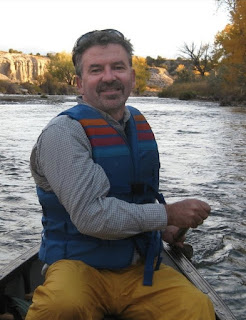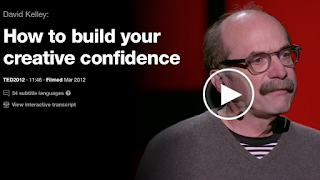 |
| David Koontz guiding a canoe |
So naturally, the conversation went something like this:
Inquisitive person: "Hi David, what's an Agile Transition Guide? Is that like a coach?"
David: "Hi, glad you asked. What does a coach do in your experience?"
Inquisitive person: "They help people and teams improve their software practices."
David: "Yes, I do that also."
Inquisitive person: "Oh, well then why don't you call yourself a coach?"
David: "Great question: Let's see... well one of the foundational principles of coaching (ICF) is that the coached person asks for and desires an interaction with a coach, there is no authority assigning the relationship or the tasks of coaching. So do you see why I don't call myself a coach?"
Inquisitive person: "Well no, not really. That's just semantics. So you're not a coach... OK, but what's is a guide?"
David: "Have you ever been fishing with a guide, or been whitewater rafting with a guide, or been on a tour with a guide? What do they do differently than a coach? Did you get to choose your guide, or were they assigned to your group?"
Inquisitive person: "Oh, yeah. I've been trout fishing with a guide, they were very helpful, we caught a lot of fish, and had more fun than going on our own. They also had some great gear and lots of local knowledge of where to find the trout."
David: "Well, there you have it... that's a guide - an expert, a person that has years of experience, has techniques to share and increase your JOY with a new experience."
Inquisitive person: "Yes, I'm starting to see that difference, but can't a coach do this also?"
David: "No, not unless the coach is willing to switch to a different modality - to one of mentoring, teaching, consulting, or protecting. Some times a guide must take over for the participant and keep the person/group within the bounds of safety - think about a whitewater river guide. A coach - by a strict interpretation of the ethics, is not allowed to protect the person from their own decisions (even if there are foreseen consequences of this action."
 And now the conversation starts to get very interesting, the Whys start to flow and we can go down the various paths to understanding. See Richard Feynman's dialogue about "Why questions"
And now the conversation starts to get very interesting, the Whys start to flow and we can go down the various paths to understanding. See Richard Feynman's dialogue about "Why questions"So, I'm not a Coach
I've been hired as a coach (largely because the organization didn't truly understand the label, role, and the ethics of coaching). This relationship was typically dysfunctional from the standpoint of being a coach. So I decide to study the role of coaching. I've done a few classes, seminars, personal one of one coach, read a lot and drawn some conclusions from my study - I'm not good at coaching within the environment and situation that Agile Coaches are hired. I've learned that regardless of the title that an organization uses (Agile Coach, Scrum Master, etc.) it doesn't mean coaching. It intends the relationship to be vastly different. Since I'm very techie, I appreciate using the correct words, and phrases for a concept. (Paraphrasing Phil Karlton: In software, there are two major challenges: cache invalidation and naming things. Two Hard Things)
So to stop the confusing and the absurd use of the terms, I quit referring to my role and skills as coaching. Then I needed a new term. And having lots of friends that have been Outward Bound instructors and understanding their roles, the concept of a river guide appeals to me in this Agile transformational role. Therefore I coin the term Agile Transformation Guide. But many organizations do not wish to transform their organization, but they do wish for some type of transition, perhaps from traditional development to a more agile or lean mindset. So a transition guide is more generic, capable of the situational awareness of the desire of the organization.

What does a guide really do?
This question may best be answered by David Kelley in his TED talk, "How to build your creative confidence." In this talk, David points out his desire to teach parents that there are not two types of children - the creative and the non-creative. There are, however, children that lost their desire to express their unique talents early in their lives. He helps people regain this capability.
It is much like how Dr. Bandura has developed his treatment for phobias. David will tell you about this basic guided mastery technique that restores self efficacy.
This is what an Agile Transition Guide does... they guide you on a journey toward self-efficacy via many techniques in the mastery of your domain skills and capabilities.
See Also:
In 2021 the Scrum Alliance & Business Agility Institute combined efforts to create - State of Agile Coaching Report. It defined an Agile Coach like this:
Here’s how we define it. An agile coach helps organizations, teams, and individuals adopt agile practices and methods while embedding agile values and mindsets. The goal of an agile coach is to foster more effective, transparent, and cohesive teams, and to enable better outcomes, solutions, and products/services for customers. Agile coaches are no longer just responsible for helping technology teams, they also help the company embrace agile as a culture shift. An agile coach doesn’t advocate for one particular method over others, but instead empowers people to work smarter, faster, and with less risk.
I note with some derision they pay no attention to the ethics of coaching and imposing the will of the organization and Agile Industrial Complex upon the people. In my learned opinion the mere use of an adjective in front of Coach - violates many of the profession's ethics.
Lyssa Adkins wrote these words about her CSC journey: I am a Certified Scrum Coach and I Am NOT Nice (2010).
Agile Coach -or- Transition Guide to Agility
Levels of Agile Coaching, The 3 Levels that you must know by Luís Gonçalves
Why does Lyssa change terms from "team facilitator" to "agile coach"? What's the differentiation she's trying to make by not using the term coach?
The Difference Between Coaching and Mentoring
Where Agile goes to Die - Dave Nicolette
About those companies that are late adopters or laggards in the innovation curve and the challenges that "coaches" have when engaging with them.
The Extinction of Agile Coaching by Jason Little
Scrum Master vs Scrum Coach by Charles Bradley
Agile Coach -or- Transition Guide to Agility by David Koontz; the whitewater guide analogy to agile coaching.
Academic paper: Coaching in an Agile Context by David Koontz
What is the ROI of Agile Coaching - Payton Consulting
Interesting Twitter conversation about the nature of "coaching" with Agile42 group.

Much of the coaching I enjoy doing is about being a "Transition Guide" toward Agility. My thinking on this is that I don't want to have to wear the Kevlar vest of the Change Agent. I prefer to model the behaviors of the best guides I've had the pleasure of knowing - the community of Outward Bound guides I've learned so much from. And the role of a true coach is one totally focused upon the client's needs (not the sponsor's desires for the client). That ethical constraint is not respected in the Agile community.
 |
| Levels of Agile Coaching by Lyssa Adkins |
Why does Lyssa change terms from "team facilitator" to "agile coach"? What's the differentiation she's trying to make by not using the term coach?
The Difference Between Coaching and Mentoring
Six Kinds of Agile Coaches by Ravi Verma Describes the HUGeB coach, the one to be.
About those companies that are late adopters or laggards in the innovation curve and the challenges that "coaches" have when engaging with them.
The Extinction of Agile Coaching by Jason Little
 |
| Extinction of Agile Coaching |
Scrum Master vs Scrum Coach by Charles Bradley
Agile Coach -or- Transition Guide to Agility by David Koontz; the whitewater guide analogy to agile coaching.
Academic paper: Coaching in an Agile Context by David Koontz
What is the ROI of Agile Coaching - Payton Consulting
Interesting Twitter conversation about the nature of "coaching" with Agile42 group.



Comments